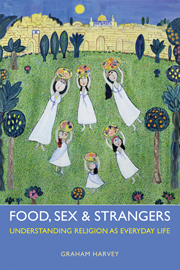Book contents
- Frontmatter
- Dedication
- Contents
- Preface
- 1 Of god and goats
- 2 Religioning elsewhere
- 3 Christianity is not a religion
- 4 Talking like a pirate
- 5 Real world
- 6 Doing violence with impunity
- 7 Respecting relations
- 8 Things full of meaning
- 9 Purity and pilgrimages
- 10 Enchantment and emplacement
- 11 Christians do religion like other people
- 12 Religion is etiquette in the real world
- Bubliography
- Index
4 - Talking like a pirate
- Frontmatter
- Dedication
- Contents
- Preface
- 1 Of god and goats
- 2 Religioning elsewhere
- 3 Christianity is not a religion
- 4 Talking like a pirate
- 5 Real world
- 6 Doing violence with impunity
- 7 Respecting relations
- 8 Things full of meaning
- 9 Purity and pilgrimages
- 10 Enchantment and emplacement
- 11 Christians do religion like other people
- 12 Religion is etiquette in the real world
- Bubliography
- Index
Summary
In 2005 a new religion was invented: Pastafarianism. The fact that it is a spoof religion, a polemical make-believe in a creator called the Flying Spaghetti Monster, casts light on common perceptions that religions necessarily possess certain components. Without agreeing this early in our venture that religions should be defined by some canon of “necessary and sufficient” elements or by a set of family resemblances (Wittgenstein [1953] 2001), this chapter makes use of the writings and acts of those “touched by the noodly appendages” of the Flying Spaghetti Monster to further develop an argument about the need to start “elsewhere” in order to rethink and better define religion. Pastafarianism is not an “elsewhere”. It is too closely moulded by the phenomenon it opposes, namely Protestant Christian Creationist efforts to get “intelligent design” taught in schools as science rather than religion. Precisely because Pastafarianism insistently contests “irrational beliefs” or non-falsifiable metaphysics, it mirrors the pervasive contemporary obsession with belief. But more is involved here than strengthening the argument of the previous chapter.
This chapter also hoists a pirate flag to announce not only that the flagship of “belief” needs challenging, but that there are other treasure ships in the normative fleet that need to be pursued aggressively. The cargo conveyed by many textbooks and even research monographs is, ultimately, minted from Christian theological materials.
- Type
- Chapter
- Information
- Food, Sex and StrangersUnderstanding Religion as Everyday Life, pp. 59 - 76Publisher: Acumen PublishingPrint publication year: 2013



